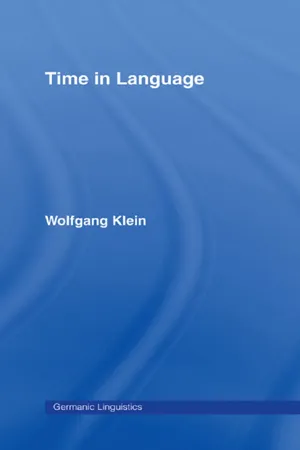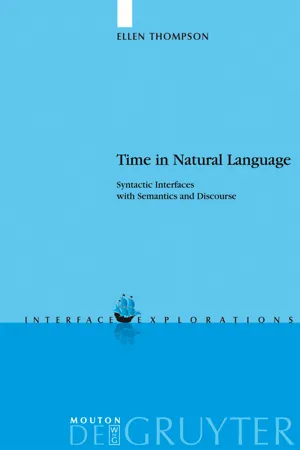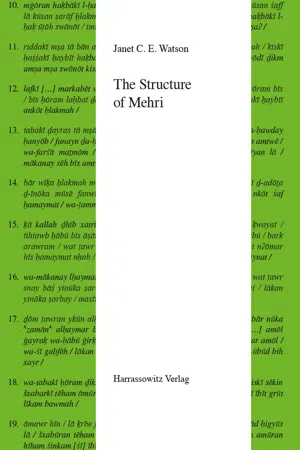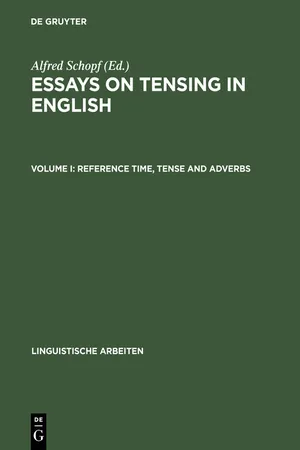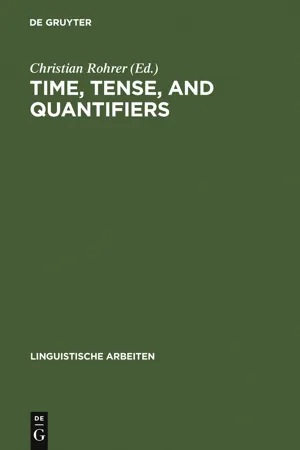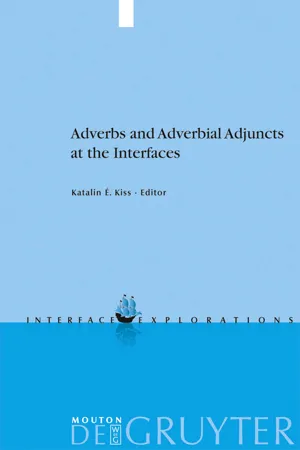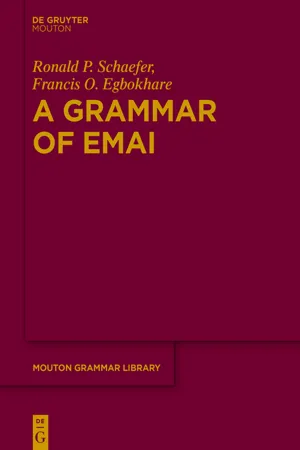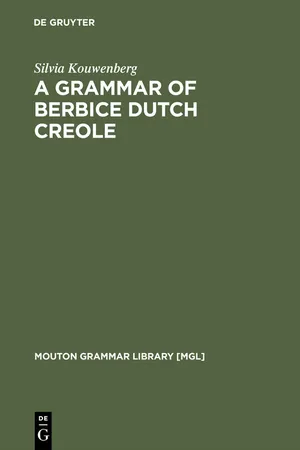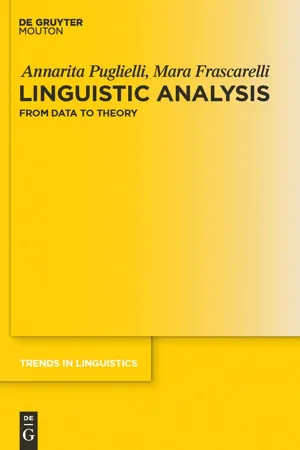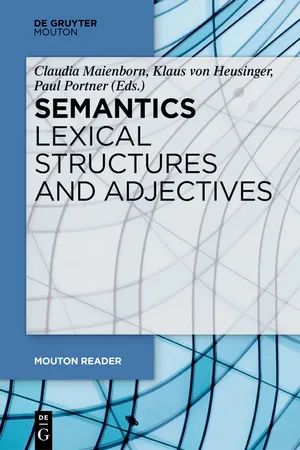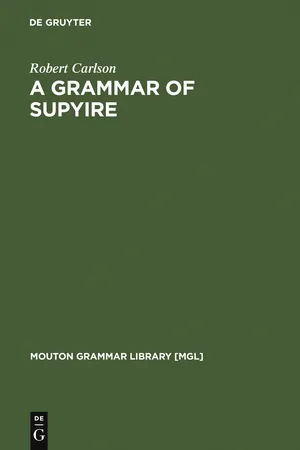Languages & Linguistics
Adverbials For Time
Adverbials for time are words or phrases that provide information about when an action takes place. They can indicate specific points in time, such as "yesterday" or "next week," or they can express duration, frequency, or the order of events. Adverbials for time help to situate actions within a temporal framework and are an important aspect of language and communication.
Written by Perlego with AI-assistance
Related key terms
1 of 5
11 Key excerpts on "Adverbials For Time"
- eBook - ePub
- Wolfgang Klein(Author)
- 2013(Publication Date)
- Routledge(Publisher)
8 Temporal adverbials and their meaningIt is now four o’clock, as every day at about this time. (Anonymous radio speaker)8.1 IntroductionThe grammatical categories of tense marking and aspect marking are not the only possibilities to express temporality, and some languages do not use this option at all. There are at least three other formal devices, which are closely interrelated and often hard to separate:1 Temporal adverbials (henceforth: TADVs), like yesterday, after the autopsy, when I first saw her curly hair, etc.2 Temporal particles, like Chinese le, Tok Pisin bai, or Hawaii Creole English bin.3 Compound expressions (other than by adverbials), in particular compound verbs, like to run on, to continue to run, to finish crying, etc.Compound expressions can be the result of word formation processes, as is the case for Aktionsarten in the original sense of this term (see section 2.3 ); in German, for example, ample use is made of this possibility. They can also be the result of various types of syntactic composition. In this chapter, we shall not systematically deal with compound expressions of either type. (A good recent discussion, with the focus on history, can be found in Brinton 1988.) Similarly, we shall not discuss temporal particles here, which are somehow between temporal adverbials and inflectional categories and occur only in a limited number of languages. (For a discussion of temporal particles in Chinese, see Li Ping 1989, Smith 1992: chapter 11 ; in Pidgins, see Labov 1970 and Romaine 1988: section 8.3 .) In the present chapter, we shall only be concerned with the contribution of temporal adverbials to the expression of temporality. The significance of this contribution should be obvious; there are languages which lack grammatical categories to express time but there is no language without temporal adverbials.Another restriction is to be made here. TADVs occur in different syntactic functions: for instance, a TADV such as yesterday can be the subject of a sentence, as in Yesterday was nice; it can also be predicative, as in The party was yesterday - eBook - PDF
Time in Natural Language
Syntactic Interfaces with Semantics and Discourse
- Ellen Thompson(Author)
- 2008(Publication Date)
- De Gruyter Mouton(Publisher)
4 2.5 Syntax of Temporal Adverbials Temporal adverbials have been analyzed as sentential and as verb phrase constituents. Chomsky (1965), Dresher (1976), and Hornstein and Weinberg (1981) argue that temporal adverbials are associated to S (IP), while Jackendoff (1972), Andrews (1982), Larson (1988), and Stroik (1990) claim that temporal adverbials are associated to VP. In this section, I present evidence that, depending on the temporal interpretation, temporal adverbials are either associated to VP or to a higher functional phrase. In order to determine the position of temporal adverbials, we must first consider what it is that these adverbials modify. If we assume that they modify tense, and that the temporal information of the clause is located in the head of IP, it seems straightforward that temporal adverbials are ad-joined to IP. Hornstein and Weinberg (1981) argue that temporal adverbials are adjoined to S (IP), not VP, based partly on subcategorization facts. They note that there is a selection relation between some PPs and Vs, as shown in (7a b), and claim that these must therefore be associated with VP. (7) a. *He dashed all day. b. He dashed into the post. They point out that there are no temporal PPs for which there is a selection relation between the PP and the V, as shown in (8a b). (8) a. He ate dinner at 6:00. b. He . . . at 6:00 However, there seem to be verbs which do require temporal adverbials, such as last , as shown in (9): (9) a. *John lasted in the room. b. John lasted (for) 3 hours. Therefore, subcategorization facts do not show that temporal adverbials must be associated to IP. 20 The Structure of Time Adverbials If we assume the analysis of tense discussed in section 2.3, whereby the temporal information of a clause is not represented simply in IP, but instead in TP (Speech time), AspP (Reference time), and VP (Event time), as in (10), there are three potential sites for temporal modifiers. - eBook - PDF
- Janet C. E. Watson(Author)
- 2014(Publication Date)
- Harrassowitz Verlag(Publisher)
9 Supplementation Adverbs modify adjectives, verbs, clauses and other adverbs. Adverbs and adverbials differ syntactically from complements in that they are supplementary and are not required to complete the proposition, they are less tightly bound to the modified element than complements, and many adverbs are not restricted to a particular position in relation to the modified element. In Mehri, there are a few words and particles that function solely as adverbs (cf. 2.8). These include some adverbs of time and degree ending in -an , -a ( h ) or -ō h , such as ḥā w ē lan ‘earlier’, ī m ō h ‘today’, n ṣ ar ō mah ( ṣ ar ō mah ) ‘now’, w ī yan ~ w ī ya ‘very; much’; 1 adverbial particles such as b ā r , ʕā d ( ā d ) and ā r ; and interrogative adverbs such as mayt ( an ) ‘when’, h ī b ō h ‘how’, kam ‘how much, how many’, wk ō h ‘why, how’. In particular contexts, NPs and, more commonly PPs, function adverbially. Adverbial clauses are introduced by adjunctions, by wa - in the case of circumstantial clauses, or paratactically. In this chapter, I examine the syntax of adverbs and adverbial phrases within simplex clauses and then the syntax of adverbial clauses. 9.1 Adverbs 9.1.1 Adverbs of time The largest number of adverbs come under the category of adverbs of time. Adverbs of time can be subcategorised into those denoting a point or period in time, such as ‘in the morning’, ‘last year’, those denoting a boundary in time before or after which an event or state occurred, such as ‘afterwards’, ‘beforehand’, those denoting the duration of a state or event, such as ‘for two days’, ‘a whole year’, and those denoting the frequency of an event, such as ‘once’, ‘never’ (cf. Quirk & Greenbaum 1973: 229–230). They include the specific adverbs listed in chapter 2 (tables 81, 82), and adverbial phrases formed from PPs and NPs relating to time, such as the time and days of the week. - eBook - PDF
- Alfred Schopf(Author)
- 2015(Publication Date)
- De Gruyter(Publisher)
71 TIME ADVERBIALS IN ENGLISH AND REFERENCE TIME Janet Harkness 1. INTRODUCTION In this article we set out to consider the role time adverbials (TA) in English play in temporal reference. After indicating the criteria by which we assign expressions to the category of time adverbial or not, we distinguish between the times contained in TA and the times named by TA, which latter we call TA time. We then discuss TA in relation to reference time (RT); we distinguish between RT and the time TA refer to and demonstrate that where TA are not required to characterize RT, they often characterize ΕΓ or sane other time/event. Finally we examine TA in combination with present perfect and pluperfect forms and consider the relevance of TA for deciding whether temporal reference is definite or indefinite. 2. WHAT ARE TA? TA, essentially, are adverbs and adverbials which refer to temporal locations or, as it is often put, to times on the time line. Thus if we conceive of time as a line running frcm left to right, and nark the moment of speech as ST (speech time) on this line: ST rH » / ν / Ν past / future /present any times left of ST are to be thought of as times anterior to ST (past), any times to the right of ST as posterior to ST (future) and any times coinciding with ST as simultaneous (present time). The precise manner in which TA refer to times and the character of the times referred to can vary considerab-ly, as the following examples illustrate. TA such as on the 8th of Kay 1919 name times of fixed identity; TA such as tomorrow, on the other hand, name times whose identity is established on the basis of whatever time constitutes 72 'now'. TA such as at 5 o'clock and at Christmas are essentially incomplete, since they refer to a time only by virtue of it being located via a set of cyclically returning entities (such as festivities or clock times). The particular clock time or festivity referred to is determined by the larger context. - eBook - PDF
Time, Tense, and Quantifiers
Proceedings of the Stuttgart Conference on the Logic of Tense and Quantification
- Christian Rohrer(Author)
- 2011(Publication Date)
- De Gruyter(Publisher)
In practice they are usually interpreted with information from context, linguistic or extra-linguistic. Sentences are also incomplete temporally if they have certain combinations of tense and time adverbial that fail to establish temporal reference on their own (see the table in 2 below). The temporal expressions of the language are assigned consistent rela-tional values: simultaneity (=), posteriority (-»·), and anteriority (·*·). Their interpretations vary, depending on syntactic and semantic factors, an essential feature of a temporal system. In English past tense is assigned its traditional value of anteriority, and present tense the value of 4 simultaneity. They are interpreted as anterior to, or simultaneous with, the time of speech or another orientation point. Time adverbials are also assigned relational values, according to their normal interpretation. A re-presentative sample of temporal order adverbials is given in 1; adverbials 2 Aspect will not be considered in this paper. 3 For discussion, see Smith (1977), and Partee (1973). 4 In this analysis Future is indicated by the combination of present tense and future adverbial; there is no future tense. 357 of frequency or duration are not included. 1. Relational value of English time ordering adverbials (not an exhausitve list) Anterior (·*·) Simultaneous(=} Posterior (->) Past Present Future a. last week now next week 3 days ago this minute in 3 days yesterday tomorrow b. previously at the same time afterwards earlier later c. on Tuesday on Tuesday d. before John left before John left There are six possible combinations of tense and time adverbial, according to relational values. Ml six are grammatical in English. Four combinations establish a time independently, and two do not; sentences with these tvro need further information to be interpretable temporally. The combinations are given in 2, with examples of each. 2. Combinations of tense and time adverbials Tense Adverb Time a. - Katalin É. Kiss(Author)
- 2009(Publication Date)
- De Gruyter Mouton(Publisher)
The compatibility with temporal adverbials can only be tested on the sentence level, and the compositionality of event structure, whereever it arises, is also a matter of syntax. The discussion will concentrate on Hungarian but it is hoped that much of what will be said carries over to other languages as well. 1 2. Types of adverbials and verb classes First, we will examine the compatibility of various verbs with five di¤erent types of temporal adverbials: Adverbs and Adverbial Adjuncts at the Interfaces , 247–268 Katalin E ´ . Kiss (ed.) Copyright 6 2009, Mouton de Gruyter, Berlin 1 The present paper is based on Chapter 4. in Kiefer (2006). (a) time span adverbials (e.g. ke ´t o ´ra ´n a ´t ‘for two hours’), which denote the length of an ongoing event; (b) durative-delimitative adverbials (e.g. ke ´t o ´ra alatt ‘in two hours’), which denote a process or activity with culmination (termination); (c) time point adverbials (e.g. ke ´t o ´rakor ‘at two o’clock’), which identify the time of a punctual event; (d) adverbials denoting the length of a resulting state (e.g. ke ´t o ´ra ´ra ‘for two hours’) 2 , (e) adverbials denoting an endpoint of a process or activity (e.g. ke ´t o ´ra ´ig ‘until two o’clock’). The importance of this fifth type of adverbial will become clear immedi-ately. For the sake of brevity, in what follows we will refer to the various types of adverbials by using the letters (a)–(e). Furthermore, each verb class will be represented by a verb, which will be used as the name of the respective verb class. 3 2.1. Statives: the verb pihen ‘rest’ Statives are compatible with (a), (c) and (e) but not with (b), (d). 4 (1) a. Ke ´t o ´ra ´n a ´t / ke ´t o ´rakor / ke ´t o ´ra ´ig pihentem . two hour for /two o’clock-at /two o’clock-until rested ‘I had a rest for two hours/at two o’clock/until two o’clock.’ b.- eBook - PDF
- Ronald P. Schaefer, Francis O. Egbokhare(Authors)
- 2016(Publication Date)
- De Gruyter Mouton(Publisher)
6 Adverbial adjuncts Postverbal adverbial adjuncts in Emai fall into classes based on their notional se-mantic character and corresponding information question. Within and across clas-ses, adjuncts are restricted by aspect, polarity, mood and positioning as topic or focus. In addition, members of some classes are morphosyntactically simple or complex. Regardless of shape or properties, adverbial adjuncts induce high tone spread at the right edge of any immediately preceding nominal constituent. For each of eight adverb classes, there exists a corresponding information ques-tion frame. One class, Temporal Deixis, shows two corresponding question frames. For a ninth class that refers to event rate or sound, there is no corresponding infor-mation question. Temporal Deixis éghè re ‘when,’ í yi ‘which one’ Temporal Frequency ísékà ‘how often’ Temporal Quantity NP ékà ‘how much’ Temporal Extent ébé' / ébí' i tee se ‘how long’ Aspectual Extent ébé' / ébí' i se ‘to what extent’ Place ébé' / ébí' ‘where’ Manner ébé' / ébí' i ‘how’ Reason émé' / émí' ze khi / li ‘why’ Rate, sound Ø Adverbs from these classes, with the exception of reason and rate, co-occur and exhibit order relations in a clause. Manner (MA) adverbs are nearer the verb and Temporal Deixis (TD) farther away. Between are ordered Extent (EX), Manner-demonstrative (MD), Frequency (FQ), Quantity (QU) and Place (PL). Some adverbs are mutually exclusive: Manner-demonstrative, Frequency, Quantity and Place. V MA EX MD / FQ / QU / PL TD 6.1 Overview of temporal adverbials Temporal deictic adverbials consist of morphosyntactically simple and complex forms. They correspond to either or both of the question frames éghè re and í yi . One class of simple temporal lexemes specifies day units or day subinterval units relative to moment of utterance. Another class segments the time line into larger-than-day units. - eBook - PDF
- Silvia Kouwenberg(Author)
- 2011(Publication Date)
- De Gruyter Mouton(Publisher)
In addition, we will pay some attention to conditional Adverbs and adverbial clauses 103 clauses. Temporal adverbs will be divided into time and duration adverbs, frequency adverbs, and order of events adverbs. 3.3.2. Temporal adverbs 3.3.2.1. Time and duration The difference noted above for the use of langgi in initial or VP-final position can also be noted for some other adverbs. In the case of en mali 'one time', the VP-final position is even associated with an entirely different meaning: in initial position, where the adverb has wide scope, it defines a point in time at which the event took place, as in (181); in final position, where the adverb has narrow scope, it means 'at once, right away, immediately', as in (182) (mali is reduced to mal here). (181) en mali, ig wa korja... one time lpl PAST work-IPF... 'At one time, we were working...' [AK 080390:24] (182) ο krikte riki en mal 3sg get-PF rich one time 'She got rich all at once.' [EK Iukuba2:p5] Some adverbs which are restricted with regard to the positions they can appear in are somtiti 'sometimes', which always appears in initial position, as in (183), and stedi 'steady', which always appears in final position, as in (184). somtiti is a wide scope adverb, while stedi is a narrow scope adverb; their syntactic positions thus reflect this difference. (183) da somtiti ju hafd nunu wedri blarwap an... BE sometimes 2sg have-to pull wild leaf-PL and... '(It is the case that) sometimes you have to pull off wild leaves, and...' [RT 86] (184) da sosen blende stedi BE thus=3pl blind steady 'This is how they keep getting blind.' [AK 210788:13] However, we also find examples of adverbs which do not appear in positions concurrent with their scope properties. Thus, dunggru 'night' in (185) characterizes a point in time at which the state described held (wide scope), but we can also find dunggru as a wide scope adverb in final position as in (186). (185) dunggru A. wa jenda hiri night A. PAST be=there here 'At night A. - eBook - PDF
Linguistic Analysis
From Data to Theory
- Annarita Puglielli, Mara Frascarelli(Authors)
- 2011(Publication Date)
- De Gruyter Mouton(Publisher)
5.5.1. The internal syntax of adverbial clauses In the literature, the subordinating element of an adverbial clause is usually ascribed to the category of complementizers (i.e. C° heads; see Grimshaw Adverbial modification 202 1991, Lasnik & Saito 1992, Vikner 1994). However, cross-linguistic data show that this type of introductory element should not be considered to be equivalent to an invariable functional head as a complementizer (e.g. English that, Italian che, German dass, etc.) but as an element having nominal properties. Let us now present some data on time and manner adverbial clauses from typologically different languages, starting with Somali, an inflecting and partly polysynthetic language (from Frascarelli & Puglielli 2005a): (56) a. Gaba-rtii oo [mar-kaas gur-iga gashay] girl-DET.AN ASSOC time-DEM house-DET enter.PST.RED baan arkay. (SOMALI) FM.SCL.1SG see.PST.1SG ‘I saw the girl after she had walked into her house.’ b. [In-t-aad shaqeemaysó] buug baan part-DET-PRO.2SG work.PROG.DEP book FM.SCL.1SG akhrinayaa. read.PROG.1SG ‘While you are working, I am going to read a book.’ c. [Goorta qorra-xdu dhacdó] imaw. momentDET sun-DET.NOM set.DEP come.IMP.2SG ‘Come when the sun sets.’ d. [Si-da Ahmed uu doonayó] erey-ga u way-DET Ahmed SCL.3SGM want.PROG.DEP word-DET to qor. write.IMP.2SG ‘Write the word the way Ahmed wants.’ First of all, it should be noted that the introductory element of subordinate clauses (corresponding to English conjunctions after, when, while and the way [that]) is a noun, as it can be modified by a DET or a DEM and can be used in sentences with a subject or object function. Such nouns are usually generic (‘time’, ‘moment’, ‘manner’, etc.); however, a certain degree of subcategorization can be observed, relating to a specific type of (adverbial) temporal modification: Mar for posteriority, in and goor for simultaneity (the former with a durative aspect, the latter with a punctual one). - Claudia Maienborn, Klaus von Heusinger, Paul Portner(Authors)
- 2019(Publication Date)
- De Gruyter Mouton(Publisher)
https://doi.org/10.1515/9783110626391-015 Kjell Johan Sæbø 15 Adverbial clauses 1 Introduction 515 2 Temporal clauses 516 3 Modal clauses 524 4 Instrumental and free adjunct clauses 533 5 Conclusions 538 6 References 540 Abstract: Adverbial clauses are subordinate clauses that modify their superordi-nate clauses. This modification can occur at various levels (such as verb phrase, tense phrase, mood phrase) and in various dimensions (such as times and worlds) and ways. These variations give rise to a categorization of adverbial clauses (tem-poral, modal, ...) and a subcategorization according to a range of relations within these dimensions, depending on the subjunction. Thus within the modal category it is customary to distinguish between causal, conditional, purpose, result, and concessive clauses. Sometimes the subjunction does not seem to encode much meaning of its own and the clause acts more like a relative clause, modifying a quantificational adverb or a modal, or specifying an underspecified predicate; sometimes, when there is no subjunction (“free” adjunct clauses), the contribu-tion of the clause is underspecified. 1 Introduction Adverbial clauses are a proper subclass of the class of all adverbials. To a considerable extent, this subclass relation distributes over the major semantic categories of adverbials commonly identified (see article 14 [this volume] (Maienborn & Schäfer) Adverbs and adverbials) . Thus in the temporal category, there are closely comparable clausal and nonclausal adverbials, e.g.: “since Benitez arrived at Anfield” - “since June 2004”. Locative adverbials and manner adverbials tend to be nonclausal, but instrumental adverbials can be both: “by hammering it” - “with a hammer”. In the modal category, clausal adverbials predominate; there are no close counterparts to conditional or causal clauses in the form of (nonanaphoric) adverbs or prepositional phrases. Kjell Johan Sæbø, Oslo, Norway- eBook - PDF
- Robert Carlson(Author)
- 2011(Publication Date)
- De Gruyter Mouton(Publisher)
con-cession or simultaneous time, are brought together in one place. A few of the sections have several subdivisions, notably those on time and conditional clauses. After all the different types have been surveyed, a final section (15.1.11) briefly explores the discourse function of adverbial clauses. 15.1.1. Time clauses Time adverbial clauses provide a temporal setting for their main clauses. The temporal relationship between the events encoded in the two clauses can be one of several types: the subordinate clause event can precede, follow, or be simultaneous with the main clause event, or it can provide the initial or ter-minal point for a durative or repetitive event or state in the main clause (cf. Givön 1990, chapter 19; Thompson and Longacre 1985). Each of these spe-cific temporal relationships has one or more special codings in Kampwo Supyire, and each is accorded a separate subsection below. Supyire, like most languages, also has a more general type of 'when' clause which does not specify the temporal relationship between the events. In fact, there are two types of 'when' clause. Whereas in English both realis and irrealis time clauses are marked with when, in Supyire two quite distinct structures are used. Realis time clauses are reduced relative clauses, irrealis 15.1. Adverbial clauses 551 ones are identical in form to conditional clauses. Compare the following ex-amples: (4) a. realis modality U ä pa g6, kk ml) / ίβίύύ kan u i. he PERF come TC and I NARR chicken give him to 'When he came, I gave a chicken to him.* b. irrealis modality U ahi ίή-ρά, mil si ήλύύ kan u ä. he COND IP-come I FUT chicken give him to 'When he comes, ΙΊ1 give him a chicken.' Each of these types is treated in a separate section below. 15.1.1.1. Realis 'when' clauses In many languages a relative clause with a generic head noun meaning 'time' or 'moment' can be used as a time adverbial clause (Thompson and Longacre 1985: 179; Giv6n 1990, chapter 19).
Index pages curate the most relevant extracts from our library of academic textbooks. They’ve been created using an in-house natural language model (NLM), each adding context and meaning to key research topics.
